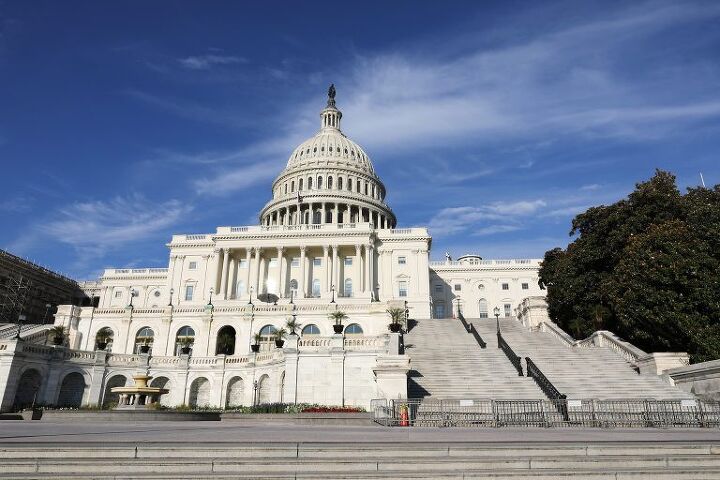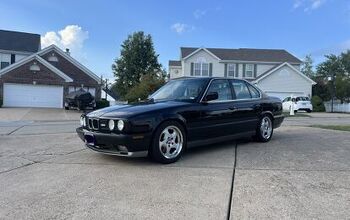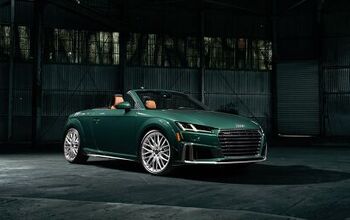EPA Head Defends Fuel Economy Rules, Industry Ties On Capitol Hill

Environmental Protection Agency chief Scott Pruitt spent the majority of his Thursday being raked over the coals by the House Energy and Commerce subcommittee before a second (even uglier) exchange with the House Appropriations subcommittee. The majority of the time was spent addressing concerns surrounding Pruitt’s expenditures — things like unnecessary first-class travel, a $43,000 soundproof phone booth, and his 24-hour security team. There were also discussions about alleged death threats against Pruitt and EPA staff, his overall conduct, and even a little bit on environmental policy.
Those discussions, however, saw some subcommittee members accuse Pruitt of championing the profits of oil companies and automakers over the wellbeing of the planet. The EPA head spent the duration of Thursday defending his actions, including planned regulatory rollbacks on fuel economy. He also supported the automotive industry’s proposal to abolish 87 octane and replace it with 95.
As ugly as the day was for Pruitt, Republicans occasionally hopped on the mic to gently support him. Rep. Kevin Cramer of North Dakota said, “I think the greatest sin you’ve done is, you’ve actually done what President Trump ran on.”
For our purposes, the majority of the EPA’s spending habits are irrelevant. However, there are exceptions. A member of the House Appropriations subcommittee discussing Pruitt’s trips abroad asked about a recent visit to Morocco, where he promoted U.S. natural gas exports. “I can’t for the life of me imagine why an EPA administrator would be over there promoting energy sales,” Rep. Chellie Pingree (D-Maine) said.
Pruitt explained the trip as a preliminary meeting for the U.S.-Morocco Free Trade Agreement and had been asked to go over liquefied natural gas by an ambassador.
His ties to the business end of energy, especially with oil companies, was called further into question later in the interview. Numerous references were made to leaked emails with oil and gas executives. But, as there is nothing illegal about being on friendly terms with people, the most the subcommittee could do is accuse him of being soft on them.
Pruitt’s proposal to roll back Corporate Average Fuel Economy (CAFE) standards was believed by many to be the smoking gun of favoritism. But he defended the decision of easing fueling standards by reminding the panel that people aren’t buying enough economical vehicles.
“We ought to endeavor as a country to set standards for lower emissions on cars that people actually want to buy,” Pruitt said. “And what’s happened is we’ve created these arbitrary levels that has put a certain sector of cars in the marketplace that no one is purchasing, which means they stay on older vehicles and defeats the purpose of the rule.”
He went on to say that one way of helping automakers meet CAFE is to pursue a national standard for high octane fuel. Automakers have come together to push 95 octane as the new regular for pump gas, claiming it will ultimately lead to higher-compression engines that bolster average economy. That endorsement certainly doesn’t help his image as playing favorites with carmakers and oil firms, especially since automakers could already do that without eliminating 87 octane via governmental action.
The State of New York recently announced its intent to sue the Trump administration if it carries out its proposal to repeal the EPA climate change rules for power plants and has sided with California in its adherence to Obama-era fuel economy regulations. However, Pruitt said there is no plan at the moment to revoke California’s waiver to maintain stricter air quality standards than those of the federal government. But he also said the EPA’s goal was to create a single program all states could adhere to, and that he is working with the California Air Resources Board to establish one.

A staunch consumer advocate tracking industry trends and regulation. Before joining TTAC, Matt spent a decade working for marketing and research firms based in NYC. Clients included several of the world’s largest automakers, global tire brands, and aftermarket part suppliers. Dissatisfied with the corporate world and resentful of having to wear suits everyday, he pivoted to writing about cars. Since then, that man has become an ardent supporter of the right-to-repair movement, been interviewed on the auto industry by national radio broadcasts, driven more rental cars than anyone ever should, participated in amateur rallying events, and received the requisite minimum training as sanctioned by the SCCA. Handy with a wrench, Matt grew up surrounded by Detroit auto workers and managed to get a pizza delivery job before he was legally eligible. He later found himself driving box trucks through Manhattan, guaranteeing future sympathy for actual truckers. He continues to conduct research pertaining to the automotive sector as an independent contractor and has since moved back to his native Michigan, closer to where the cars are born. A contrarian, Matt claims to prefer understeer — stating that front and all-wheel drive vehicles cater best to his driving style.
More by Matt Posky
Latest Car Reviews
Read moreLatest Product Reviews
Read moreRecent Comments
- Analoggrotto Does anyone seriously listen to this?
- Thomas Same here....but keep in mind that EVs are already much more efficient than ICE vehicles. They need to catch up in all the other areas you mentioned.
- Analoggrotto It's great to see TTAC kicking up the best for their #1 corporate sponsor. Keep up the good work guys.
- John66ny Title about self driving cars, linked podcast about headlight restoration. Some relationship?
- Jeff JMII--If I did not get my Maverick my next choice was a Santa Cruz. They are different but then they are both compact pickups the only real compact pickups on the market. I am glad to hear that the Santa Cruz will have knobs and buttons on it for 2025 it would be good if they offered a hybrid as well. When I looked at both trucks it was less about brand loyalty and more about price, size, and features. I have owned 2 gm made trucks in the past and liked both but gm does not make a true compact truck and neither does Ram, Toyota, or Nissan. The Maverick was the only Ford product that I wanted. If I wanted a larger truck I would have kept either my 99 S-10 extended cab with a 2.2 I-4 5 speed or my 08 Isuzu I-370 4 x 4 with the 3.7 I-5, tow package, heated leather seats, and other niceties and it road like a luxury vehicle. I believe the demand is there for other manufacturers to make compact pickups. The proposed hybrid Toyota Stout would be a great truck. Subaru has experience making small trucks and they could make a very competitive compact truck and Subaru has a great all wheel drive system. Chevy has a great compact pickup offered in South America called the Montana which gm could make in North America and offered in the US and Canada. Ram has a great little compact truck offered in South America as well. Compact trucks are a great vehicle for those who want an open bed for hauling but what a smaller more affordable efficient practical vehicle.


































Comments
Join the conversation
Hybrid power trains would go a long way in getting close to the 2025 mandates. I doubt just an ICE will get there without making it a hybrid. I doubt that these standards will completely go away and if so only for a short period of time.
Imagine that; a stupid Agent Orange appointee, and big oil lackey calling the shots. He has no Science degree either. Anything Pruitt says is pure crap.